in this article...
- Which dogs are considered large breed?
- The nutritional benefit of a large breed puppy food
- What can go wrong if i do not feed a large breed puppy food
Did you know large breed puppies grow at a faster rate than little dogs?
Large breed puppy food is all about finding just the right balance for your puppy to grow at the proper speed for their skeletal structure. Large breed and giant breed puppies can grow too fast which can cause skeletal issues, hip and joint issues, and bone abnormalities.
Feeding your puppy large breed specific food can give you the peace of mind that your puppy will get the balanced nutrition that they need to develop at a safe and normal rate.
Which dogs are considered large breed?
There are some variations on what constitutes a large breed dog, but most veterinarians and pet nutritionists agree that any breed that will be over 50lbs in adulthood and have a height greater than 24 inches is considered a large breed. Other sources say 55lb – 100lb constitutes a large breed. The AAFCO (Association of American Feed Control Officials), however, considers dogs over 70lbs to be a large breed. Some examples of large breed dogs include:
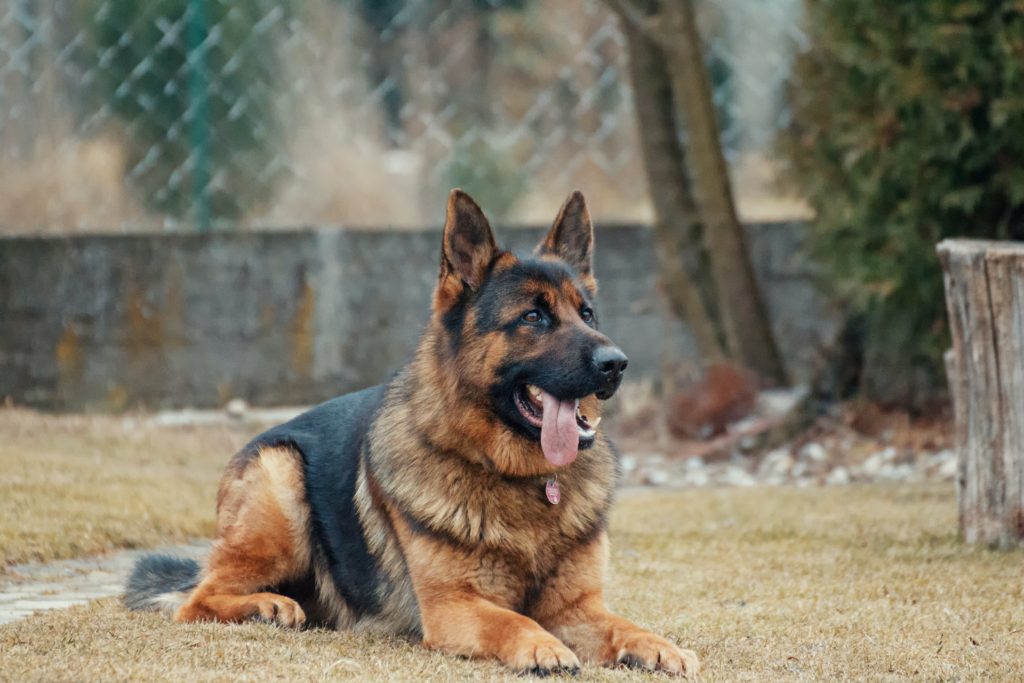
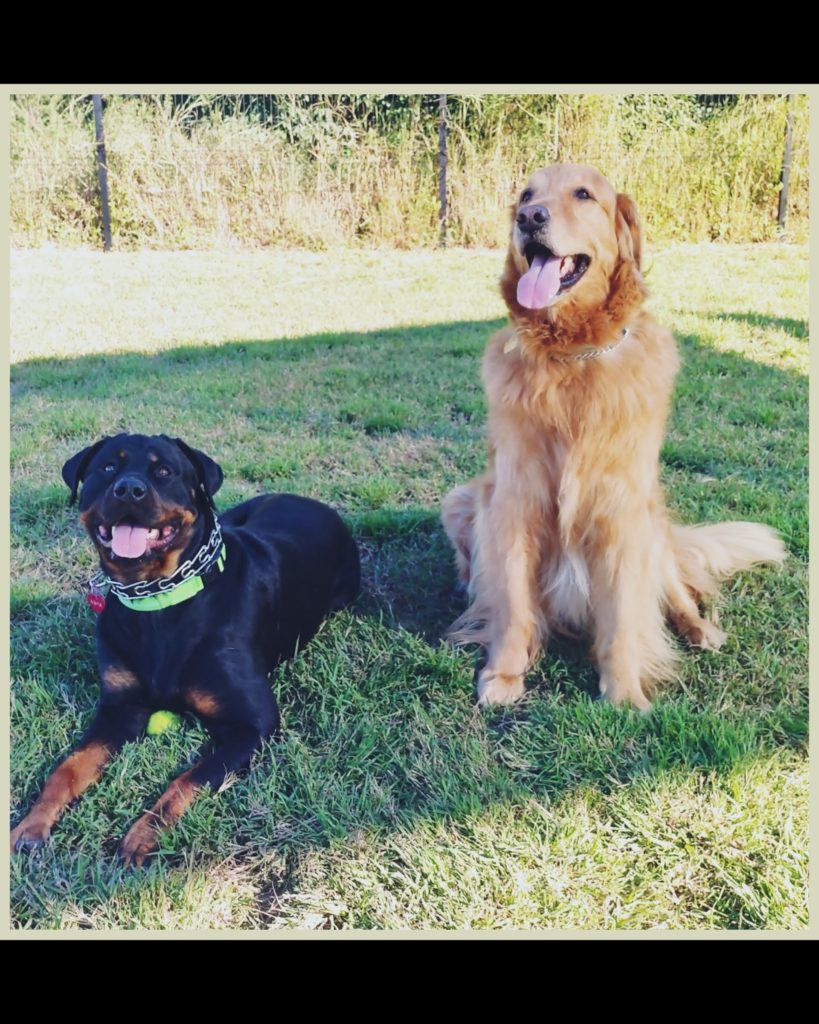
- Golden or Labrador Retriever
- Boxer
- German Shepherd
- Greyhound
- Dalmatian
- Collie
- Chow Chow
- Poodle
- Siberian Husky
- Rottweiler
- Pointer
- Weimaraner
- Bloodhound
If a dog is of gigantic proportions and weighs over 100lbs they are considered a giant breed. For the sake of this article, we will mainly focus on large breeds. Some examples of giant breed dogs include:
- St. Bernard
- Great Dane
- Bullmastiff
- Cane Corso
- Bernese Mountain Dog
- Irish Wolfhound
- Anatolian Shepherd
- Dogue de Bordeaux
- Newfoundland
- Great Pyrenees
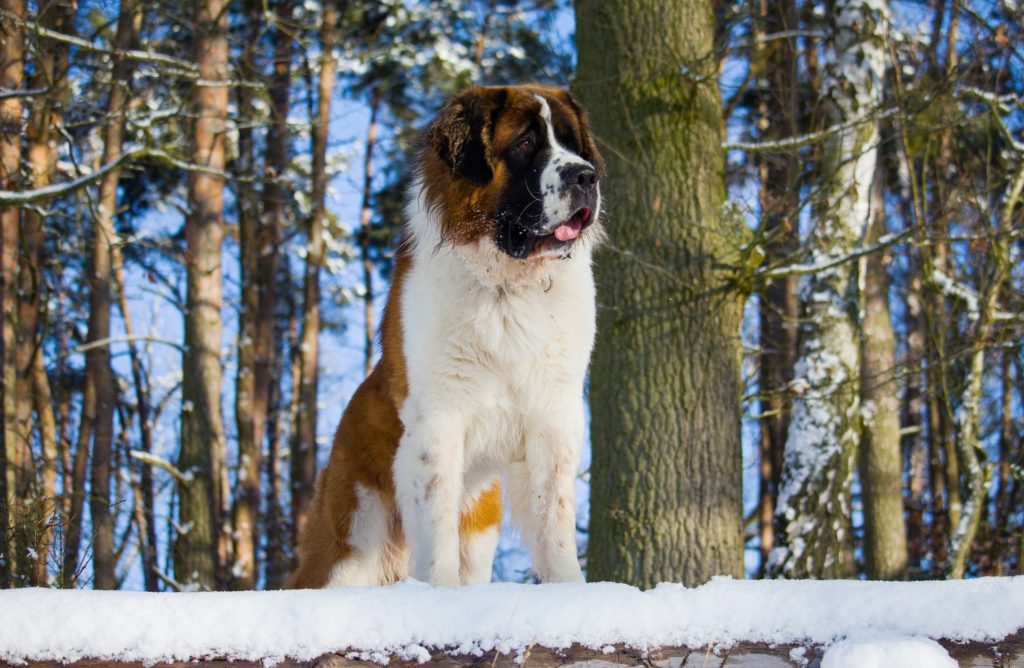
The nutritional benefit of large breed puppy food
It is especially important for growing large breed puppies to get the proper nutritional balance in their diets. Size specific food for large breed puppies focus on a high-quality protein, beneficial fatty acids, fiber, vitamin D, reduced calcium and phosphorus, and lower energy density (or lower in fat and calories).

kibble size
Another difference with large breed foods is the kibble size. The kibble size in large breed foods is slightly bigger than average or small breed dog foods. Kibble size is more of a preference for big dogs rather than a necessity, but a larger kibble means the dog must chew more versus the inhaling he may do of a smaller kibble.
high-quality protein
A high-quality protein is important because the protein in your dog’s food is what helps develop a healthy immune system. Protein is also a source of energy and helps build muscle.
Although it may cost more, it is important to make sure that the food you choose has a high-quality protein. This means that at least the first few ingredients listed are whole proteins such as beef, chicken, lamb, pork, fish, etc. as opposed to meat by-products such as liver, heart, lungs, spleen, kidneys, etc. Chicken actually offers a bonus because it contains glucosamine and chondroitin, two ingredients that help strengthen joints.
vitamin d3
Large breed puppy food also provides a source of vitamin D3 which is important because dogs do not produce enough of it on their own. Vitamin D3 also regulates the amount of calcium that gets absorbed into the kidneys and intestines.
calories
Energy, is translated into calories, and is one of the main factors that contribute to your puppies growth rate. While it is important for your growing puppy to eat all the calories they need to, in order to compensate for all the energy they expend, you still need to make sure you aren’t overfeeding. About half of the calories your puppy consumes is used in tissue growth and skeletal development.
Too many calories, brought on by overfeeding, can lead to rapid growth, which can lead to bone and joint problems. To help prevent this issue, large breed puppy food has less calories and the fat is reduced to around 12%, as opposed to the 20% that is found in regular dog foods.
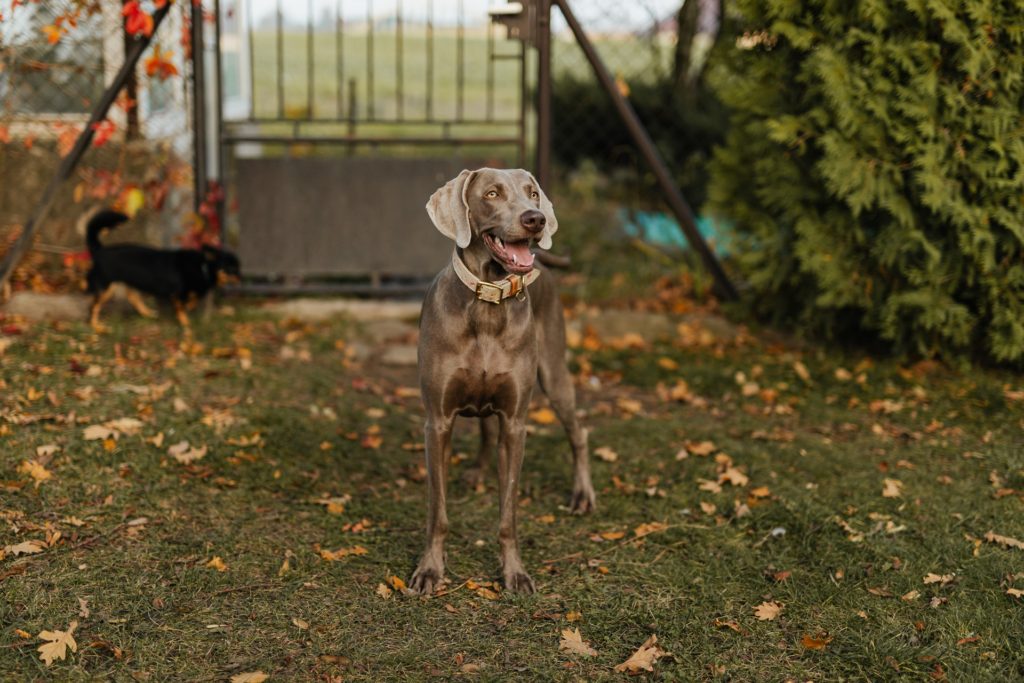
Calcium and Phosphorus
Puppies younger than 6 months of age cannot control the amount of calcium that they absorb. Too much calcium during the fast-growing period between 3 and 5 months can lead to harmful effects on their skeletal structure. Puppies get all their calcium from the food that they eat so getting a large breed puppy food is key to making sure your puppy gets a well-balanced meal.
Calcium and phosphorus work together to maintain a healthy skeleton. The ratio between the two should be between 1:1 and 1:2. A puppy on a good large breed food should not need any calcium supplements and a breed size specific food will provide the delicate balance between calcium and phosphorus that your puppy needs.
vitamins and minerals
Certain vitamins and minerals play a part in skeletal structure as well. Vitamin D, vitamin E,copper, zinc, manganese are all important in developing healthy bones and feeding a large breed puppy food will assure that your puppy is getting the proper amounts of vitamins and minerals. Too much or too little can be harmful to their overall growth and development.
what can go wrong if i do not feed a large breed puppy food?
As mentioned above, large breed puppies grow very fast. Nutrition plays a key role in making sure, that their bones and muscles are growing in synchrony.
If bones grow too fast, they are less dense which makes them weak. If you are overfeeding your puppy and he’s a little on the chunky side, this could spell trouble. Those weak bones are being overtaxed by his extra weight and thus putting even more strain on his joints and bones.
Some bone and joint problems that can come from overfeeding include elbow dysplasia, hip dysplasia, osteochondritis (inflammation of cartilage and bone), and panosteitis (painful inflammation of the outer surface of the long bones in the legs).
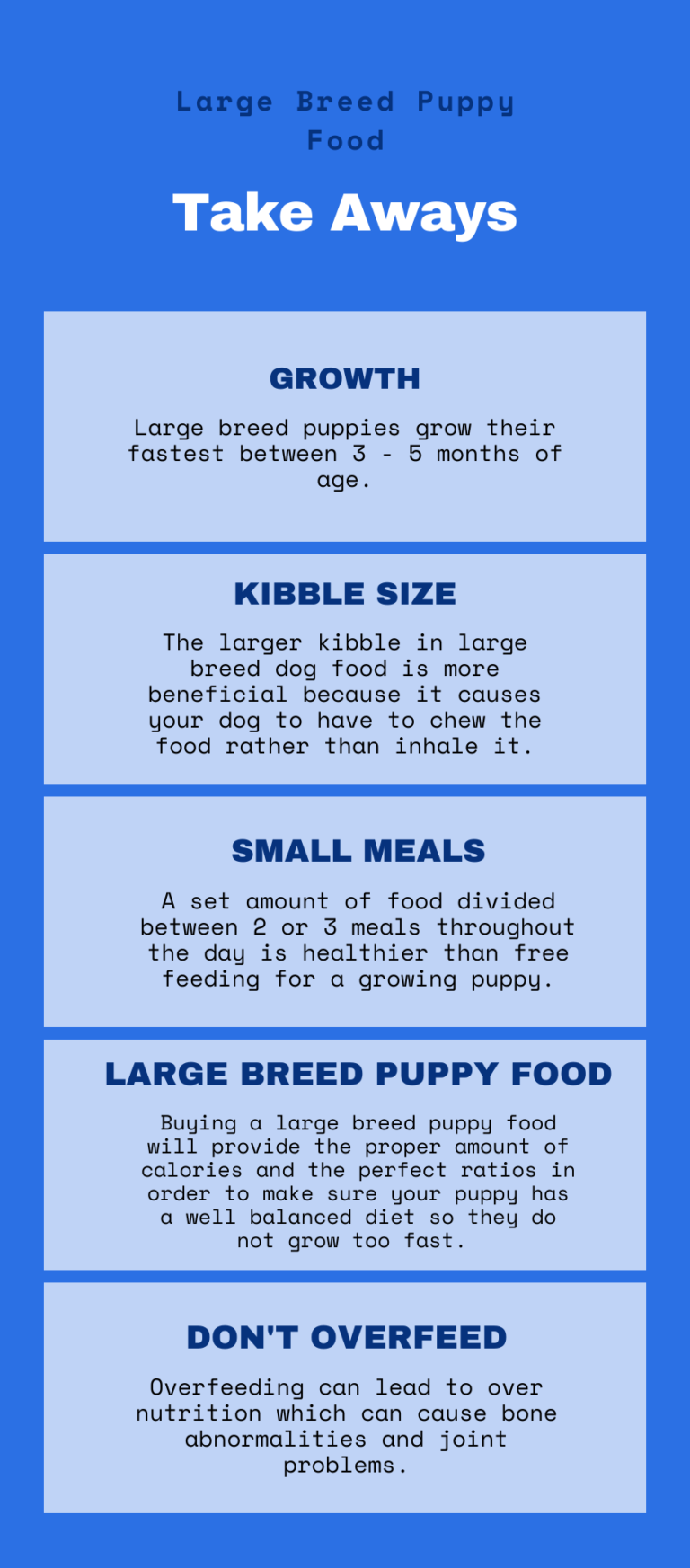
Sources
Buzhardt, Lynn, DVM. https://vcahospitals.com/know-your-pet/nutritional-requirements-of-large-and-giant-breed-puppies
Hall, Jackie. “Small, Medium, and Large Breed Food: What’s the Difference?” Big Dog Den, https://bigdogden.com/small-medium-and-large-breed-dog-food-whats-the-difference/
“Should You Be Feeding a Large Breed Dog Formula?” Diamond Pet, https://www.diamondpet.com/blog/performance/nutrition-performance/large-breed-dog-formula/
“Importance of Large Breed Puppy Food- Dog Nutrition” AvoDerm, https://avodermnatural.com/blog/large-breed-dog-food-nutrition/

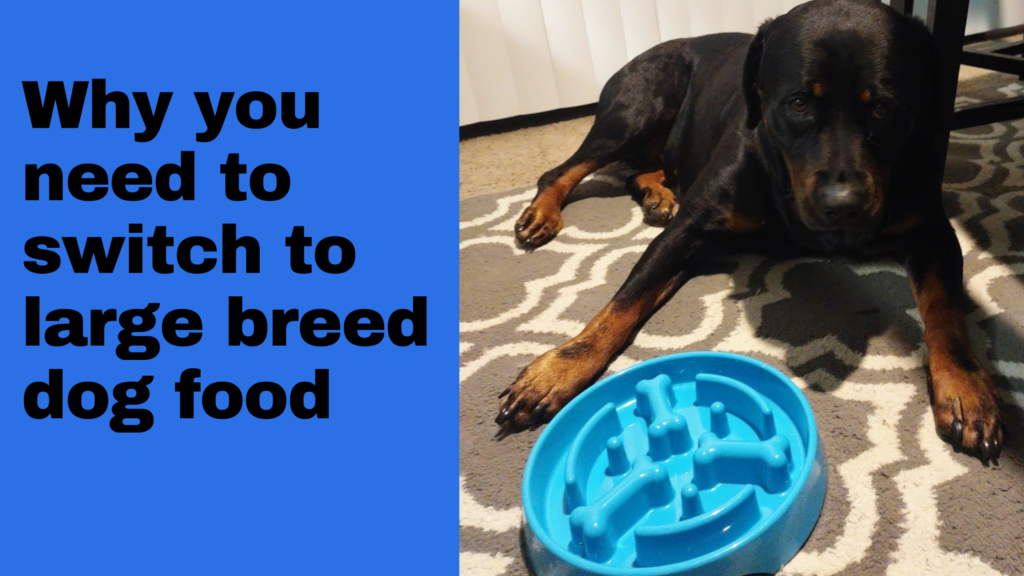
I like your article very much. Especially the boxes inset with intro and take aways!
Thank you so much!
didn’t realize how vital vitamins play a part in my dog’s life and diet thank you for the article and the information by the way beautiful dogs in the pictures I love the golden retriever and the Rottweiler especially